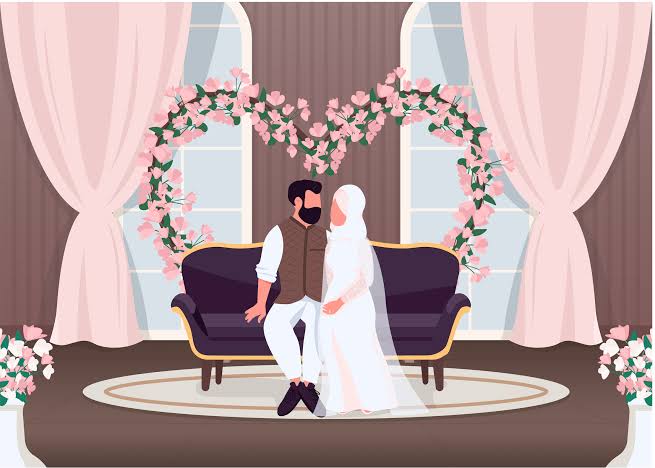Marriage in Islam: A sacred journey of love, respect, spiritual growth
Marriage, or Nikah, in Islam is not merely a social contract; it is a sacred bond built on love, mutual respect, and the shared goal of spiritual growth.
It is one of the most significant institutions in Islam, a means of establishing a peaceful, harmonious life and creating a family structure that aligns with the teachings of Allah. As the Quran and Hadith emphasize, marriage is a profound relationship that holds both emotional and spiritual dimensions, guiding believers on a path of happiness, responsibility, and devotion.
Marriage as a Divine Command
In the Quran, Allah commands marriage as a means of fulfilling the natural instincts of humanity while also offering a space for spiritual development. Allah says:
“And of His signs is that He created for you from yourselves mates that you may find tranquility in them; and He placed between you affection and mercy. Indeed, in that are signs for a people who give thought.” (Quran 30:21).
This verse highlights the foundational principles of marriage in Islam: peace, love, and mercy. A successful marriage is one where both partners are a source of comfort and solace to one another, offering support, understanding, and compassion as they navigate the challenges of life together.
The Role of Mutual Respect and Understanding
At the core of a thriving Islamic marriage is mutual respect and understanding. Both spouses are encouraged to treat one another with kindness, patience, and fairness. The Prophet Muhammad (PBUH) said:
“The best of you are those who are the best to their wives.” (Tirmidhi).
This hadith emphasizes that a husband’s kindness and respect towards his wife is a reflection of his character and piety. Likewise, a wife is encouraged to treat her husband with the same respect and understanding. In a marriage, the concept of Mu’awana—or mutual support—is key. Both partners should be supportive, whether emotionally, financially, or spiritually, working together to build a life rooted in faith and righteousness.
Marriage as a Source of Peace and Comfort
Islam teaches that the marital relationship should provide a sanctuary of peace, offering both physical and emotional comfort. The Quran describes the relationship between husband and wife as being akin to garments for one another:
“They are clothing for you and you are clothing for them.” (Quran 2:187).
This metaphor illustrates how spouses are meant to protect and shield one another from the hardships of life. Just as clothing provides warmth, protection, and comfort, a good marriage offers security, emotional refuge, and love. This closeness helps both individuals grow in their faith, as they become partners in worship and in fulfilling Allah’s commands.
Marriage and the Pursuit of Happiness
While marriage in Islam is a means of fulfilling physical and emotional needs, it is also a means of spiritual growth. Through the marital bond, both partners help one another achieve greater closeness to Allah. The Prophet Muhammad (PBUH) said:
“Marry those who are religious, for they will help you to succeed.” (Ibn Majah).
In Islam, marriage is a partnership where both individuals strive to improve their character, build a home of faith, and seek the ultimate goal of eternal happiness in the Hereafter. A husband and wife work together to raise children who will carry on the legacy of Islam, serving as a source of blessings and rewards.
The Importance of Communication and Patience
In any relationship, especially in marriage, communication is key. Islam emphasizes the importance of open, honest communication between spouses. Disagreements and challenges are a natural part of life, but how a couple handles these moments can determine the success of their marriage. Patience (Sabr) and gentle speech are qualities that the Prophet Muhammad (PBUH) encouraged in marital interactions.
READ ALSO: Shirk: The greatest sin in Islam
He said:
“The most complete of the believers in faith are those who are best in character. And the best of you are those who are the best to their wives.” (Tirmidhi).
In times of difficulty, a patient and understanding approach will lead to resolution, allowing the couple to grow stronger together. Islam teaches that marriage is not just about physical intimacy but about supporting each other emotionally and spiritually through all of life’s ups and downs.
Rights and Responsibilities in Marriage
In Islam, both husband and wife have distinct rights and responsibilities, and fulfilling these duties is crucial for maintaining a balanced and harmonious relationship. The husband is expected to provide for his wife financially, protect her, and treat her with respect. He is also encouraged to be affectionate and understanding.
The wife, in turn, is expected to support her husband, care for the home, and assist in raising children in a nurturing environment. Both partners should work together in fulfilling these roles, creating a partnership based on trust and mutual care.
It is important to note that these roles are not meant to be burdensome but rather reflect the natural responsibilities of each spouse in creating a balanced home. Both partners are to be considerate of each other’s needs, helping each other grow in both this life and the Hereafter.
The Concept of Love in Marriage
Love in marriage is not just about romantic feelings, but about a deep commitment to one another’s well-being. The love between a husband and wife in Islam should be based on mutual respect, compassion, and a shared purpose. The Prophet Muhammad (PBUH) taught that love in marriage is an ongoing process of nurturing and caring for one another.
He said:
“When a man loves his wife, he should show it through kindness, tenderness, and respect. And when a woman loves her husband, she should show it by being supportive, understanding, and loyal.” (Sahih Muslim).
The Quran also reflects the deep emotional connection that should exist in marriage, urging spouses to find contentment and happiness with one another:
“And live with them in kindness. For if you dislike them—perhaps you dislike a thing and Allah makes therein much good.” (Quran 4:19).
This verse highlights the importance of kindness, even during difficult moments. Love in marriage is cultivated through acts of caring, understanding, and trust, and it grows as both partners work together for the good of their relationship and the family.
Marriage as a Journey of Growth and Spirituality
Ultimately, marriage in Islam is about the mutual growth of both partners, both as individuals and as a couple.
Through marriage, individuals have the opportunity to strengthen their connection with Allah, raise righteous children, and create a loving, supportive family environment. It is a journey of faith, love, sacrifice, and devotion, designed to lead both partners to success in this life and eternal happiness in the Hereafter.
Islam teaches that the true success of a marriage is not in avoiding difficulties but in overcoming them together, with patience, compassion, and faith.
The ultimate goal is to create a harmonious and loving relationship that reflects the beauty of Islam and the mercy of Allah.
By following the principles of Islam in marriage, couples can build a strong foundation for a lasting and fulfilling partnership, one that serves as a means of both worldly joy and spiritual elevation.
Follow the Neptune Prime channel on WhatsApp:
Do you have breaking news, interview request, opinion, suggestion, or want your event covered? Email us at neptuneprime2233@gmail.com





